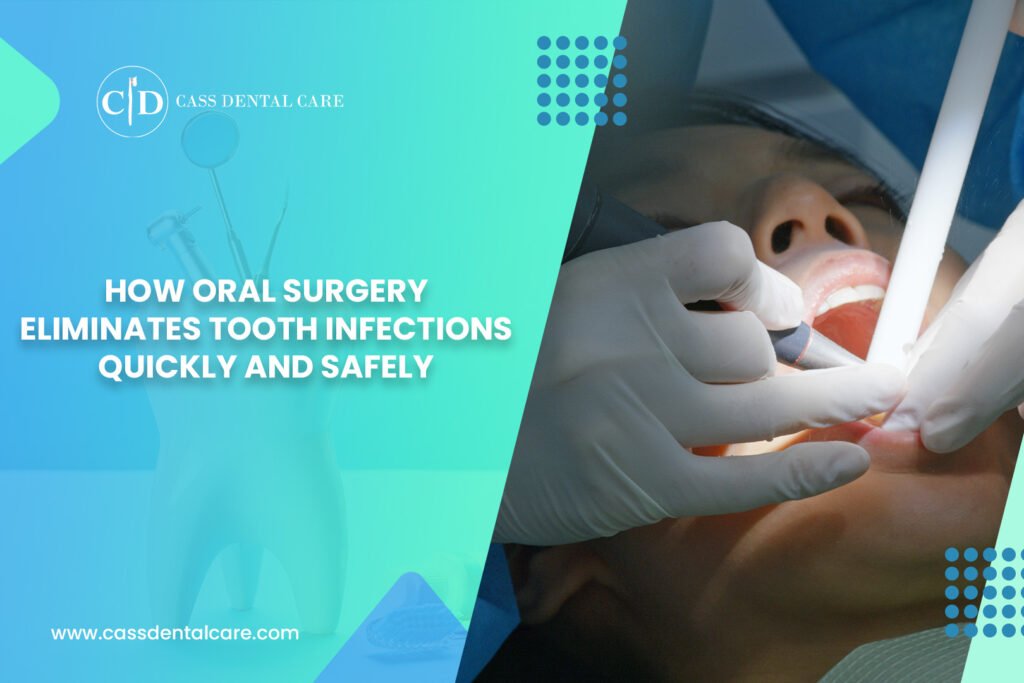Tooth infections are more common than many realize, and if left untreated, they can severely impact oral health. These infections, caused by bacterial growth in the tooth’s inner layers or surrounding tissue, can lead to extreme discomfort, abscesses, and even systemic health complications.
Timely and effective treatment is crucial for maintaining oral and overall health. Oral surgery for tooth infections stands out as a highly effective solution. It offers a safe and targeted approach to eliminating infections while restoring dental health. By addressing the root cause, oral surgery ensures long-term relief and prevents further complications.
Understanding Tooth Infections
What is a Tooth Infection?
Tooth infections occur when bacteria enter the pulp, the inside of the tooth, through cracks, holes, or gum disease. They can spread quickly and lead to pain, swelling, and more serious dental issues.
Key causes of tooth infections include:
- Untreated cavities or decay.
- Periodontal (gum) disease.
- Trauma or injury exposing the tooth’s inner layers.
Symptoms to watch for:
- Severe toothache or throbbing pain.
- Swelling in the gums, face, or jaw.
- Continuous bad breath or a bad taste in the mouth.
- Sensitivity to hot or cold foods.
If you notice these signs, promptly seeking safe tooth infection treatment can prevent further damage.
Risks of Ignoring Tooth Infections
Neglecting a tooth infection can lead to serious complications, including:
- Abscess Formation: A pocket of pus that can spread the infection to adjacent teeth, gums, or bone.
- Systemic Infections: Bacteria from the infection can travel to other parts of the body, causing life-threatening conditions like sepsis.
- Tooth Loss: Untreated infections can damage the tooth structure beyond repair.
Ignoring these risks not only endangers oral health but also impacts overall well-being. Taking proactive steps, such as prevent dental problems with oral surgery, can save time, pain, and future expenses.
How Oral Surgery Helps in Eliminating Tooth Infections
Oral surgery offers a definitive solution when infections become severe or resist other treatments like antibiotics. Oral surgery for tooth infections is designed to address the root cause and restore oral health effectively. Here’s how it works:
- Direct Access to the Problem Area
Oral surgery allows dentists to access hard-to-reach areas of the tooth or gum where the infection has taken hold. This ensures thoroughly removing infected tissue and bacteria, which is not always possible with non-surgical treatments.
- Drainage and Removal of Infected Tissue
An incision drains pus for abscesses, relieving pressure and reducing pain. In cases where the tooth pulp is severely damaged, procedures like root canal surgery or tooth extraction remove the infected areas entirely, preventing further spread.
- Preservation of Oral Health
One key benefit of oral surgery is its ability to protect surrounding teeth and tissues. By addressing the infection at its source, oral surgery prevents recurrence and ensures the neighboring teeth remain unaffected.
- Quick Recovery
Thanks to modern surgical techniques and minimally invasive approaches, recovery from oral surgery is relatively quick and straightforward. With proper care and follow-up, patients can quickly return to their daily activities with improved oral health.
And if you’re interested in reading more about oral surgery then you must check out our blog on oral surgery recovery tips.
Common Oral Surgeries for Tooth Infections
When conservative treatments like antibiotics or temporary fillings fail to resolve an infection, oral surgery becomes critical in providing safe tooth infection treatment. Here are the most common procedures used to address tooth infections effectively:
- Root Canal Surgery (Apicoectomy)
A root canal is often the first treatment when an issue occurs deep inside the tooth. An apicoectomy—a surgical procedure to remove infected tissue around the tooth’s root—may be necessary in severe cases. This method directly targets the infection while preserving the natural tooth, making it a preferred option for long-term dental health.
- Tooth Extraction
Extraction becomes the safest option when a tooth is severely damaged and cannot be saved. Removing the infected tooth prevents the infection from spreading to nearby teeth and tissues. Post-extraction replacement options such as implants or bridges can restore functionality and appearance.
- Incision and Drainage
For abscesses caused by bacterial infections, this procedure involves making a small incision to drain pus. This helps reduce pressure, alleviate pain, and start the healing process. Incision and drainage are often paired with other treatments to eliminate the infection.
- Gum Surgery
When infections spread to the gums, periodontal surgery may be needed to remove infected tissue, clean the affected area, and promote healing. This approach is crucial in preventing the infection from damaging the supporting structures of the teeth, like bones and ligaments.
Each procedure is tailored to address the patient’s needs, ensuring safety and effectiveness in eliminating infections.
When Should You Consider Oral Surgery?
Knowing when to opt for surgical intervention ensures fast tooth infection treatment and prevents complications. Here are key signs and circumstances where oral surgery may be necessary:
- Persistent Symptoms: If pain, swelling, or difficulty chewing continues despite standard treatments, surgery may be required to address the problem entirely.
- Failure of Conservative Treatments: Surgery becomes the most reliable solution if antibiotics or other non-invasive measures fail to resolve the infection.
- Recurrent Infections: Chronic infections indicate an underlying issue that oral surgery can address directly, preventing future occurrences.
- Abscess or Severe Damage: Visible swelling, pus formation, or significant structural damage to the tooth or gum are clear indicators for surgical intervention.
If you’re experiencing these issues, consulting your dentist or oral surgeon can help you determine the best action.
Conclusion
Tooth diseases can be excruciating and harmful to your health if not treated immediately. Seeking immediate care is crucial to prevent complications and restore oral health. With expert intervention, Darien oral surgery offers quick, safe, and practical solutions to eliminate infections and promote healing.
From root canal surgery to tooth extraction and gum procedures, oral surgery targets infections at their source, providing long-lasting relief and enhanced dental health.
Don’t let a tooth infection affect your quality of life. Consult your dentist or explore oral surgery options to take the first step toward recovery. Schedule a consultation today and safeguard your smile for the future!





